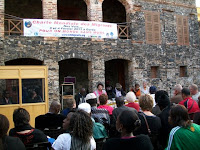The Pan-African Women’s Action Summit (PAWAS) was created in 2005 to convene diverse black diaspora women to promote collaboration, networking, skill building, as well as personal health and wellness to strengthen the Pan-African Philanthropy Movement's capacity to impact the social and other issues that affect our communities.
Our workshop is entitled Beyond Us and Them: Sharing Our Stories, Healing Our Communities. Here's the workshop description:
It is a fact that the “black community” in this country is changing and is a lot more diverse than we assume. While the majority of the Black population is still African Americans – there are significant and increasing populations of Black immigrants that are adding challenging existing assumptions of the homogeneity in the “black.”
When then Senator Obama first announced his candidacy for the highest Presidency, much of the discussion among Black communities was the challenge in defining his identity. Clearly he is black and yet he is not of slave-ancestry; he was not “black enough” for some and too black for others. His identity as a man whose father is African, married to an African American made visible the profound need for race dialogue among diverse black communities. It also made visible both the commonalities and differences in the black community.
Statistics show that an estimated 5% of the Black population is made up of immigrants from Africa and another 12% of immigrants from the Caribbean. Yet, racial discourse is framed always within the black/white dichotomy and very little exists to have transnational conversations which bring race, culture, identity and history into our communities.
We at Priority Africa Network and the Black Alliance for Just Immigration have held several community dialogues that brought together diverse groups from Africa, the Americas and the Caribbean in the San Francisco/Bay Area. Lessons learned from these over the past five years have given insight into ways to bring much needed exchanges on the critical need to know one another’s history, to go beyond the assumptions of damaging stereotypes held on all sides.
This workshop will present one model on how to hold open and healing exchanges about the divisions that exist in the African diaspora community. As the number of Black immigrants increases in the coming decade, and there is increased visibility of the diversity of Black communities, the opportunity to learn and use these transformative ideas is critical. It will also highlight the role and power of diverse black women, and their allies, in building community across ethnic and racial lines.














